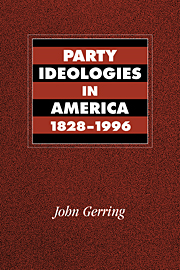Book contents
- Frontmatter
- Contents
- List of Figures and Tables
- Acknowledgments
- Part I Introduction: The Existence of Party Ideology
- Part II The Whig-Republican Party
- 3 The National Epoch (1828–1924)
- 4 The Neoliberal Epoch (1928–1992)
- Part III The Democratic Party
- Part IV Conclusions: Sources of Party Ideology
- Epilogue: 1996
- Appendix The Search for a Method
- Selected Bibliography
- Index
3 - The National Epoch (1828–1924)
Published online by Cambridge University Press: 05 June 2012
- Frontmatter
- Contents
- List of Figures and Tables
- Acknowledgments
- Part I Introduction: The Existence of Party Ideology
- Part II The Whig-Republican Party
- 3 The National Epoch (1828–1924)
- 4 The Neoliberal Epoch (1928–1992)
- Part III The Democratic Party
- Part IV Conclusions: Sources of Party Ideology
- Epilogue: 1996
- Appendix The Search for a Method
- Selected Bibliography
- Index
Summary
Notwithstanding the organizational death of one party and its replacement by another, a civil war virtually without precedent in modern Anglo- European history, and several realignments of partisan voting allegiances, the evidence collected in this study suggests that a fairly consistent view of the political world was carried over from the party of Clay to the party of Lincoln to the party of Calvin Coolidge, the last bearer of American Whiggism.
What did this ideology consist of? I argue that these parties embodied a view of politics and society best summarized by the appellation National. National Republicans embraced laborers as well as capitalists within a broader framework valorizing work and social harmony. They were mercantilists, believing that the state had a particularly important role to play in ensuring economic development. They were statists∧ believing in strong government and the dignity of government service, and believing that good government occurred when the voice of the masses was properly channeled through institutions, rather than directly expressed. They were a party of order, inveighing against the dangers of unrestrained individualism, violence, and parochialism. They were Yankee Protestants, believing that human beings had a responsibility to reform themselves and to reform society. They were, finally, Nationalists, believers in the preeminence of American interests and American ideals.
The Value of Work and the Necessity of Social Harmony
In 1844, a Whig party pamphlet forthrightly declared, “In this country, labor, since our independence was acquired, always has been and still is, not only an original and fundamental, but a controlling power in society, and in the state.
- Type
- Chapter
- Information
- Party Ideologies in America, 1828–1996 , pp. 57 - 124Publisher: Cambridge University PressPrint publication year: 1998
- 1
- Cited by



